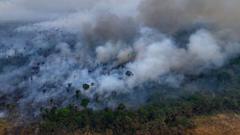While tropical forests have been devastated at a record pace, there are glimmers of hope in Southeast Asia where strict policies have notably reduced deforestation rates.
Alarming Spike in Tropical Forest Loss Hits Record Highs

Alarming Spike in Tropical Forest Loss Hits Record Highs
Satellite analysis indicates an unprecedented rate of tropical forest destruction in 2024, largely driven by wildfires, particularly in the Amazon.
The latest satellite analysis has revealed a sobering trend: the world's tropical forests faced their most extensive loss ever recorded last year. An estimated 67,000 square kilometers (26,000 square miles) of these vital ecosystems vanished in 2024, a staggering area comparable to the entirety of the Republic of Ireland or 18 football fields slipping away every minute.
The primary culprit behind this surge in destruction was wildfires, which have now outpaced agricultural land clearing for the first time in recorded history. The Amazon rainforest emerged as one of the hardest-hit regions, grappling with severe drought conditions and heightened fire risks.
Experts underscore the critical importance of tropical forests, which store vast amounts of carbon, playing a crucial role in mitigating climate change. Recent figures pose alarming questions about these ecosystems' resilience in an era of global warming. According to Professor Matthew Hansen of the University of Maryland, certain sections of the Amazon may be approaching a "tipping point," beyond which irreversible decline could occur. He highlighted concerns regarding the potential "savannisation" phenomenon, where flourishing rainforests could be irreversibly converted into savanna.
In stark contrast to the Amazon's trajectory, Southeast Asia presented a more favorable report card, showing reductions in forest loss due to proactive governance and community efforts. Indonesia stood out, with an 11% decline in primary forest loss compared to the previous year, attributing this success mainly to the enforcement of "no burning" laws.
While the worsening situation in Brazil has raised alarm bells, experts emphasize that consistency in protection policies is paramount. The upcoming COP30 UN climate summit, hosted in the Amazon, is viewed as pivotal for enhancing global efforts in forest conservation. Potential strategies include providing financial incentives to nations that preserve their tropical forests, addressing the current economic imbalance favoring deforestation over conservation.





















